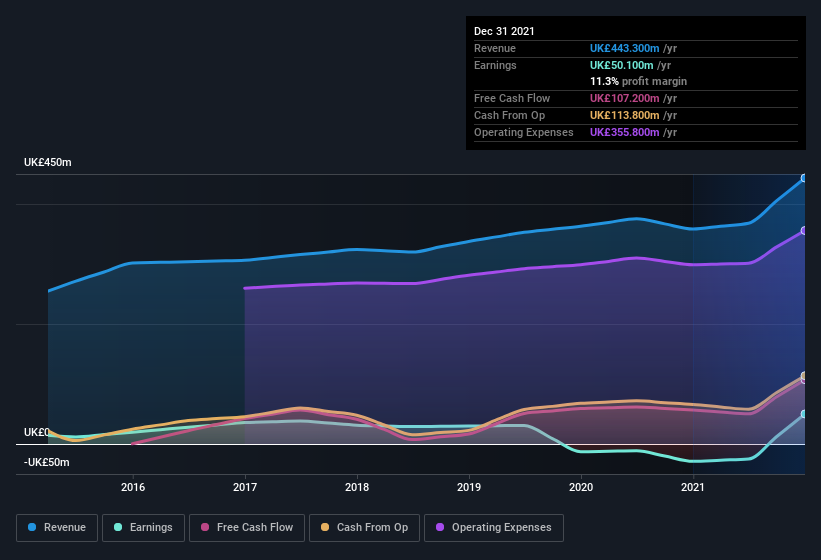- United Kingdom
- /
- Marine and Shipping
- /
- LSE:CKN
The Strong Earnings Posted By Clarkson (LON:CKN) Are A Good Indication Of The Strength Of The Business
Even though Clarkson PLC's (LON:CKN) recent earnings release was robust, the market didn't seem to notice. We think that investors have missed some encouraging factors underlying the profit figures.
See our latest analysis for Clarkson

Examining Cashflow Against Clarkson's Earnings
Many investors haven't heard of the accrual ratio from cashflow, but it is actually a useful measure of how well a company's profit is backed up by free cash flow (FCF) during a given period. The accrual ratio subtracts the FCF from the profit for a given period, and divides the result by the average operating assets of the company over that time. You could think of the accrual ratio from cashflow as the 'non-FCF profit ratio'.
Therefore, it's actually considered a good thing when a company has a negative accrual ratio, but a bad thing if its accrual ratio is positive. While it's not a problem to have a positive accrual ratio, indicating a certain level of non-cash profits, a high accrual ratio is arguably a bad thing, because it indicates paper profits are not matched by cash flow. To quote a 2014 paper by Lewellen and Resutek, "firms with higher accruals tend to be less profitable in the future".
Clarkson has an accrual ratio of -0.53 for the year to December 2021. That indicates that its free cash flow quite significantly exceeded its statutory profit. To wit, it produced free cash flow of UK£107m during the period, dwarfing its reported profit of UK£50.1m. Clarkson's free cash flow improved over the last year, which is generally good to see.
That might leave you wondering what analysts are forecasting in terms of future profitability. Luckily, you can click here to see an interactive graph depicting future profitability, based on their estimates.
Our Take On Clarkson's Profit Performance
Happily for shareholders, Clarkson produced plenty of free cash flow to back up its statutory profit numbers. Because of this, we think Clarkson's underlying earnings potential is as good as, or possibly even better, than the statutory profit makes it seem! And it's also positive that the company showed enough improvement to book a profit this year, after losing money last year. The goal of this article has been to assess how well we can rely on the statutory earnings to reflect the company's potential, but there is plenty more to consider. So if you'd like to dive deeper into this stock, it's crucial to consider any risks it's facing. Case in point: We've spotted 2 warning signs for Clarkson you should be mindful of and 1 of them is significant.
Today we've zoomed in on a single data point to better understand the nature of Clarkson's profit. But there is always more to discover if you are capable of focussing your mind on minutiae. Some people consider a high return on equity to be a good sign of a quality business. So you may wish to see this free collection of companies boasting high return on equity, or this list of stocks that insiders are buying.
New: AI Stock Screener & Alerts
Our new AI Stock Screener scans the market every day to uncover opportunities.
• Dividend Powerhouses (3%+ Yield)
• Undervalued Small Caps with Insider Buying
• High growth Tech and AI Companies
Or build your own from over 50 metrics.
Have feedback on this article? Concerned about the content? Get in touch with us directly. Alternatively, email editorial-team (at) simplywallst.com.
This article by Simply Wall St is general in nature. We provide commentary based on historical data and analyst forecasts only using an unbiased methodology and our articles are not intended to be financial advice. It does not constitute a recommendation to buy or sell any stock, and does not take account of your objectives, or your financial situation. We aim to bring you long-term focused analysis driven by fundamental data. Note that our analysis may not factor in the latest price-sensitive company announcements or qualitative material. Simply Wall St has no position in any stocks mentioned.
About LSE:CKN
Clarkson
Provides integrated shipping services in Europe, Middle East, Africa, Americas, Asia-Pacific, and worldwide.
Flawless balance sheet average dividend payer.
Similar Companies
Market Insights
Community Narratives



